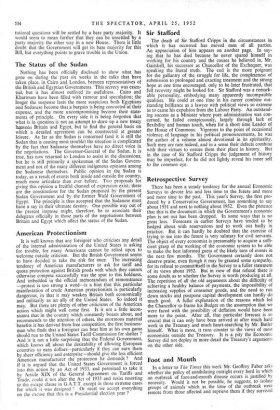American Protectionism
It is well known that any foreigner who criticises any detail of the internal administration of the United States is asking for trouble, for many Americans cannot be relied upon to welcome outside criticism. But the British Government seems to have decided to take the risk for once. The increasing tendency of American manufacturers to ask for tariff and quota protection against British goods with which they cannot otherwise compete successfully was the spur to this boldness. And imbedded in the official memorandum of remonstrance —protest is too strong a word—is a hint that this particular manifestation of crude American protectionism is particularly dangerous, in that it may weaken Britain both economically and militarily as an ally of the United States. So indeed it may. But there are plenty of other criticisms of the American action which might well come first. Is it not a little incon- sistent that in the country which constantly boasts about, and recommends to the attention of others, the enormous material benefits it has derived from free competition, the first business- man who finds that a foreigner can beat him at his own game should run to the United States Tariff Commission for shelter ? And is it not a little surprising that the Federal Government, which knows all about the desirability of allowing European countries to earn dollars—particularly if they can earn them by sheer efficiency and enterprise—should give the less efficient American manufacturer the protection he demands ? And if it is argued that the United States Government is forced into this action by an Act of 1933, and permitted to take it by Article XIX of the General Agreement on Tariffs and Trade, could it not alter the Act of 1933 and resist resorting to the escape clause in G.A.T.T. except in those extreme cases for which it was designed ? Or must we accept everything on the excuse that this is a Presidential election year ?


































 Previous page
Previous page